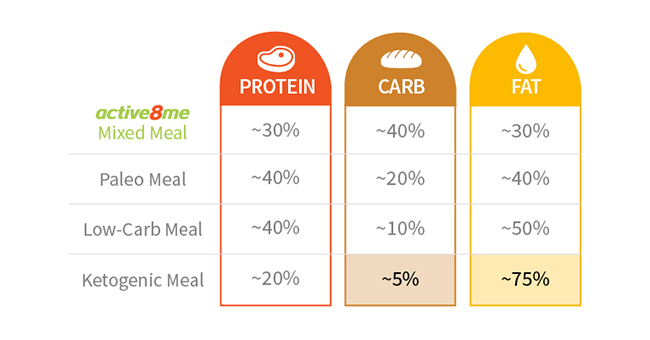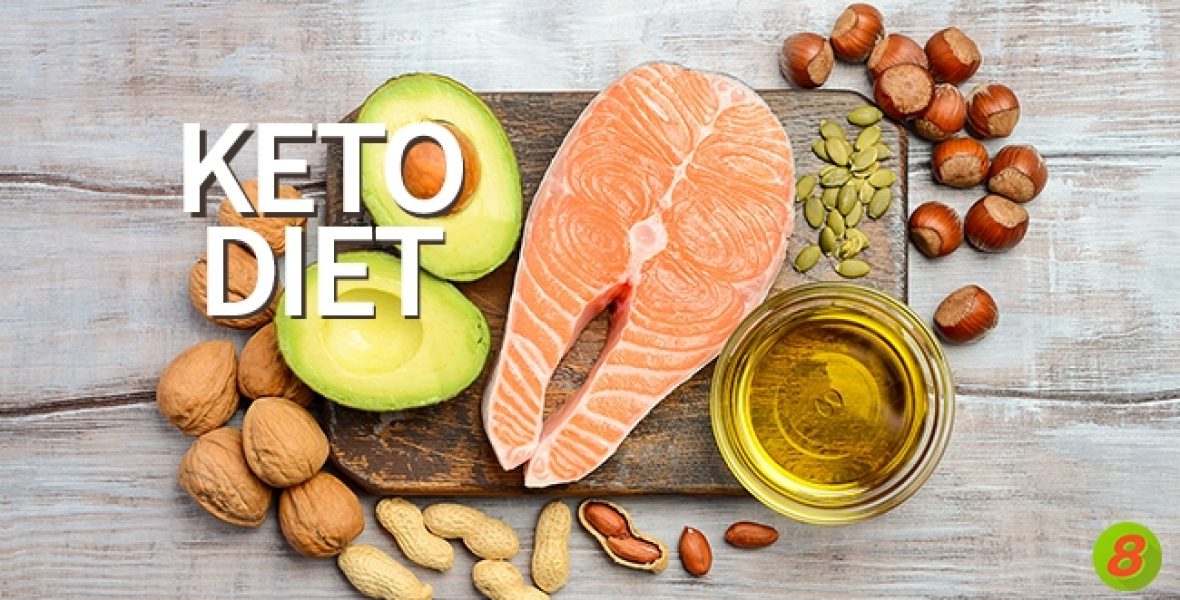It seems the buzz word in the celebrity weight loss world is ‘keto diet’. Every other day we see something pop up on social media about how the keto diet can have you dropping weight in an instant, enhancing performance, curing health problems and more. Sounds too good to be true? Well, it’s time we looked a little closer at these claims and really put them to the test. To help you sort out fact from fiction and science from marketing hype.
What is the keto diet?
The ketogenic diet, or as it has become popularly known, the ‘keto diet’ is a low-carb, high fat regime. It involves drastically reducing carbohydrate intake and replacing it with fat. It promotes the idea of using your stored fat to fuel your body instead of glucose obtained from carbohydrates. The reduction in carbs puts your body into a metabolic state called ketosis.
Ketosis would happen naturally if you go into ‘starvation mode’. This is where your body thinks there is no food available and starts to burn your fat reserves, to spare muscle for as long as possible. The premise of the ketogenic diet is to trick your body into thinking it’s starving without actually starving! Sounds like an instant weight loss winner, right?! So why aren’t we all doing it? We put it to the test on one of our Active8me staff members to see what really happens on the keto diet.
So, why the hype with the keto diet?
The concept of the ketogenic diet has its origins as far back as the time of Hippocrates, around 400 BC, with the specific term/diet introduced by Dr Russell Wilder and the Mayo Clinic in 1924. Its development was based in medical treatment of epilepsy and improving brain health. So the concept of the ketogenic diet is far from new. From all appearances, it seems, like many trends, that it has been repurposed – in this instance, for weight loss. And so we arrive at today – where what is old is new again!
The keto diet necessity – Getting into ketosis
The first thing to know is that getting into a state of ketosis requires carbohydrate levels in your body to be so low that you start to burn fat. This is very difficult. The simplest way to induce ketosis is to restrict your carbohydrate intake to no more than 50g per day – think 2 slices of bread or 1 banana total carbs for the entire day! The rest of your calories are from small proportions of protein and moderate amounts of fat.

The second thing to know is that it doesn’t happen straight away. It can take from three days to a couple of weeks for your body to go from burning glucose for fuel into ketosis, where you’re burning fat. When you burn fat, your liver produces ketone bodies. These are used as your source of energy instead of glucose. This process is not as easy as it sounds and can lead to a number of flu-like side effects, such as nausea, mental fog, cramps, headaches, diarrhea and tiredness.
Active8me reality check
“The initial stages of getting into ketosis were exciting, but hard. I was loving that I could eat all the fatty foods I normally limited. I was measuring my progress using ketosticks, so I knew it took me just over a week to get into ketosis. But I (and my family) could easily tell it took this long as I was feeling very moody and miserable. I’m normally a decisive and assertive person, so I struggled with a lack of focus and general ‘brain fog’ during this time.”
The keto diet lifestyle – Living in ketosis
The next thing you need to know is that it is not as easy as it sounds to maintain this. The keto diet’s stringent restriction of carbohydrates is key to successfully remaining in ketosis. It is this sustained reduction in carb intake which is the part that is hotly debated among the health community. Dieticians point out that a lack of adequate carbohydrates and fibre can wreak havoc with gut health as well as deplete you of necessary vitamins and minerals.
Given that the keto diet was originally designed for specific medical conditions that resulted in seizures, there still remains no long-term evidence about the benefit of the keto diet in regular, healthy people. The other main concern health professionals have is the high consumption of saturated fats while on the keto diet. While the keto diet promotes the use of ‘good fats’ eg. unsaturated fats such as avocado, unfortunately many people tend to ignore this important necessity. They do this without realising that different fats have varying health impacts. This has led some to then spruik ‘clean vs dirty’ keto diets. Jaclyn Reutens, Active8me expert and dietician, explains that this potential excessive consumption of saturated fats (think butter, palm oil, beef and pork fat) will increase your Low-Density-Lipoprotein (LDL) or bad cholesterol. This can readily contribute to heart disease.
Active8me reality check
“While at first, I loved that I could have all the ‘fatty’ foods I liked, I soon started to crave fresh fruit, bread and pasta, which I basically had to give up completely. This was mentally hard for me as I felt deprived and like it was a punishment. Initially, I felt a massive drop in my energy in the first couple of weeks. But, while living in ketosis my energy levels seemed rather stable across the day and during activities. I was pleased that I could sustain my long runs and bike rides with no sugar gels. But the thought of maintaining this over the long term was something I struggled with.”
The keto diet results – Does it work?
This is such a loaded question, as it really depends on what exactly you are doing the keto diet for! As with any diet, if the calories you eat are less than your calories burned you will lose weight. And, by virtually removing an entire macronutrient group you are left with a whole lot less calories. It’s also common knowledge that most processed foods are high in sugars (carbohydrates). So, removal of these from your diet will of course be beneficial for both weight loss and health in general. But, in the Active8me world, the mark of a good diet is one that is balanced and sustainable for YOUR entire lifestyle.
Active8me reality check
“I initially lost a lot of weight, but gradually regained some of it, especially when my endurance training was dramatically cut back due to injury. Like anything, it only works if you stick to it! While I was in ketosis both my moods and my energy levels felt quite even. However, I found I would ‘accidentally’ fall out of ketosis from consuming too much protein (which was converted to glucose), which meant going through the process again. I must admit, the keto diet seemed to work well for my endurance activities but not so much for my lifestyle. My family was NOT on the diet with me, so it took a lot of extra time, preparation and discipline to stick to it. I also found eating out almost impossible.”

The keto diet verdict – Our thoughts
Living a healthy lifestyle is a co-ordination of physical and mental health. You need to fuel your body with adequate nutrition and have a mindset that is open to forming healthy habits. Too much or too little of anything is not sustainable for health success. Simply put, severe restriction never works in the long run. Whether it be the Atkins diet, the Keto diet or some other diet, it needs to be sustainable over the long term. The keto diet seems to lack balance that is necessary for our real, present, everyday lives. You will definitely see weight loss results, but they will only remain while you are on the keto diet. Which, even for our dedicated Active8me athlete was a hard feat.
So if you’re a “regular person” who just wants to be healthy and fit, and whom does not have a specific medical condition, then you can achieve this without the Ketogenic diet. Be careful of what you read on the internet and wary of marketing hype. Think sensibly about diet trends that are not based in science or extrapolate results to other areas. The best ‘diet’ is a balance of clean eating, controlled portions, plenty of water and understanding what fuels your own body best. If you want this type of balanced approach, along with experts who have put together workout plans and mindset lessons, then try one of the Active8me programs today! They are designed by experts for your success.














